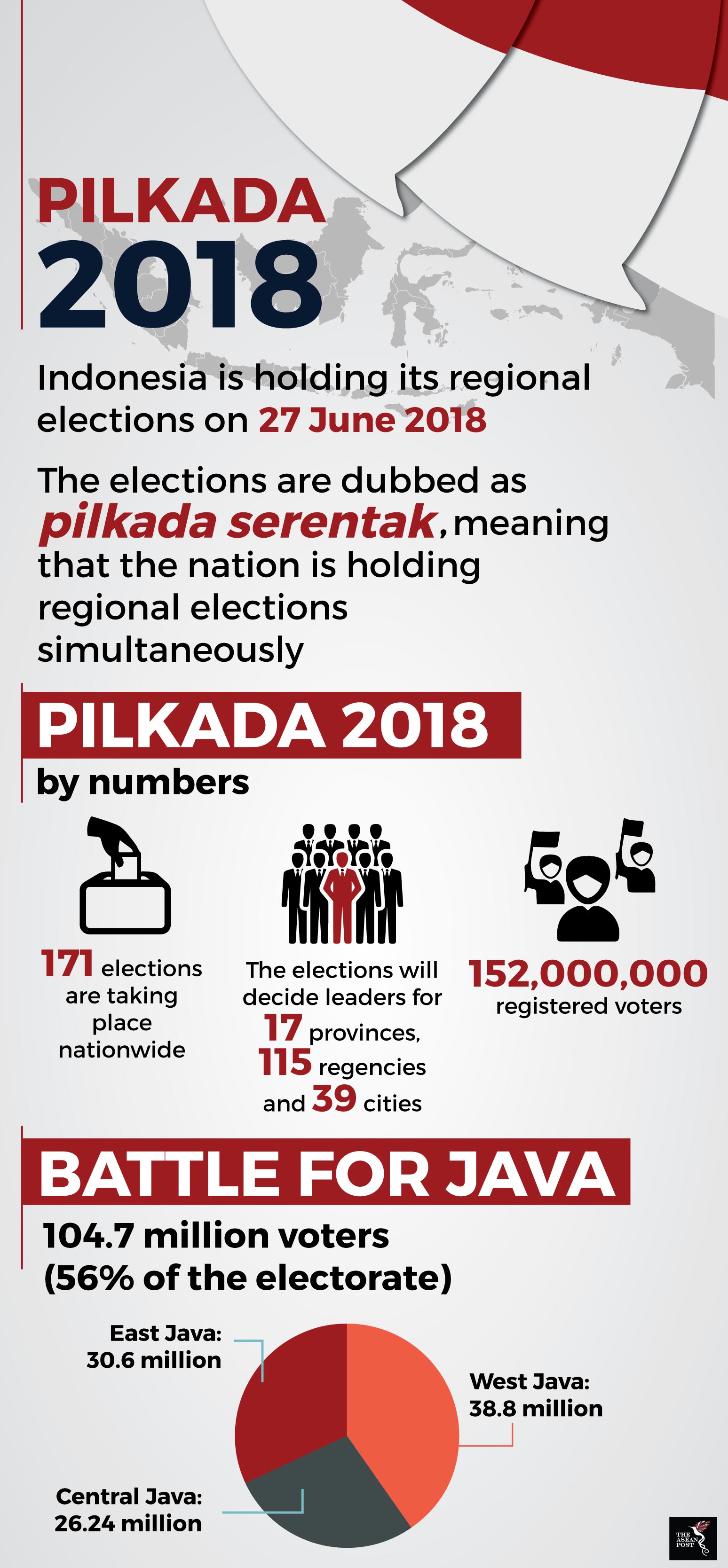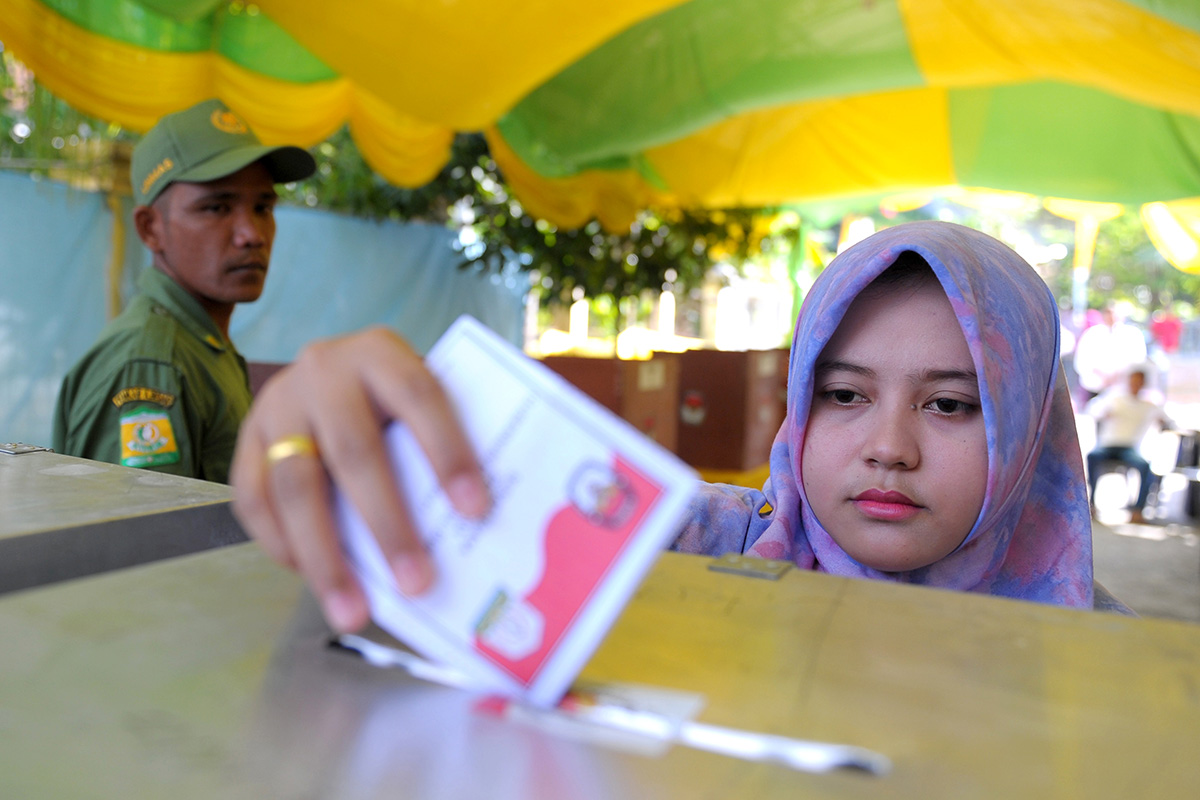Tomorrow, the world’s third-largest democracy, Indonesia will head to the polls. The regional elections – locally known as the Pemilihan Kepala Daerah or Pilkada for short – will take place in 171 regions throughout the country. Over 152 million voters across Indonesia will elect their governors, regents and mayors, for 17 provinces, 115 regencies and 39 cities.
This year’s Pilkada will take place simultaneously on the same day, making it only the third time the country has had simultaneous elections. The first one was held in 2015. A major significance of this election is that it is being held just months before the general elections. The general elections are slated to be held in April next year and will determine whether current president Joko Widodo or Jokowi will carry on for another term.
Normally, the Pilkada is seen as an entirely separate event from the national general elections, with the former usually having no effect on the outcomes of the latter. However, with the two elections being held a year between each other, analysts are saying that the regional elections could be a useful indicator of voting trends that could be reflected in the 2019 elections. It would also serve as a litmus test for parties to gauge their popularity in the runup to the general elections next year.
Some national politicians have taken the opportunity to use the Pilkada to enhance their profiles. Agus Yudhoyono of the Democratic Party and son of former president Susilo Bambang Yudhoyono spent some time on the ground promoting his party’s local candidates. However, others see his participation as a move to boost his profile. Prabowo Subianto, the leader of the main opposition party Great Indonesia Movement Party (Gerindra), was also seen making appearances on Pilkada campaigns, further igniting speculation that he could be running for president next year.

Source: Various sources
Testing ground
Analysts suggest that the Pilkada could see the solidifying of a Gerindra, Prosperous Justice Party (PKS) and National Mandate Party (PAN) coalition. The right-wing coalition was instrumental in defeating Jakarta’s incumbent governor, Basuki Tjahaja Purnama or Ahok in the 2017 gubernatorial elections. The coalition along with members of Islamist parties such as Islamic Defenders Front (FPI) carried out a sectarian campaign, accusing Ahok of blasphemy, sparking outrage among the majority-Muslim electorate. As a result of that campaign, the coalition’s candidate, Anies Baswedan, won the election and Ahok was subsequently jailed for two years.
According to a paper written by Eve Warburton, Deasy Simandjuntak and Charlotte Setijadi from the ISEAS-Yusof Ishak Institute on the upcoming elections, the coalition seeks to replicate the tactics used in Jakarta nationwide. This has sparked fears that such a move could swing the political rhetoric in the country to that of sectarianism and religious exclusivity.
However, the paper by the ISEAS-Yusof Ishak Institute has revealed that such tactics are difficult to transplant nationwide. The paper concludes that no clear patterns have emerged to reflect the possibility of national coalitions. In Indonesia, regional elections are more complicated than national ones. Rivals in national politics could even be seen endorsing the same candidate. For example, in East Java, candidates Gus Ipul and Puti Guntur Soekarnoputri are backed by the Indonesian Democratic Party of Struggle (PDI-P), the PKB, the PKS and Gerindra.Therefore, it is unlikely the forces that defeated Ahok could emerge on a national scale in the regional elections.
Fight for West Java
Observers and analysts are pointing to West Java as being the litmus test for the upcoming presidential elections. West Java is home to over 30 million voters and according to the Governor of West Java, Ahmad Heryawan, “If you win the election in West Java, you’ll win the presidential election.”
In West Java, the country will witness a battle between Sudrajat – a candidate reportedly handpicked by Prabowo himself – against three other candidates. The other candidates are Ridwan Kamil, backed by the PPP and the PKB, Tubagus Hasanuddin endorsed by PDI-P and Deddy Mizwar backed by the Democratic Party. According to surveys held before the election, initial findings do not favour Jokowi’s PDI-P and Gerindra’s candidates.
This however, shouldn’t be a surprise nor should it be seen as an indicator of Jokowi or Prabowo’s decline in popularity. The dynamics of regional elections reveal that the competition is more personality based rather than party-centred. Furthermore, the results of local elections are more often than not swayed by factors such as communal conflicts, local dynasties and varying religious dynamics.
